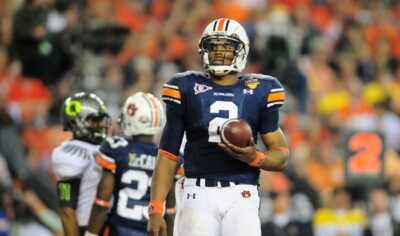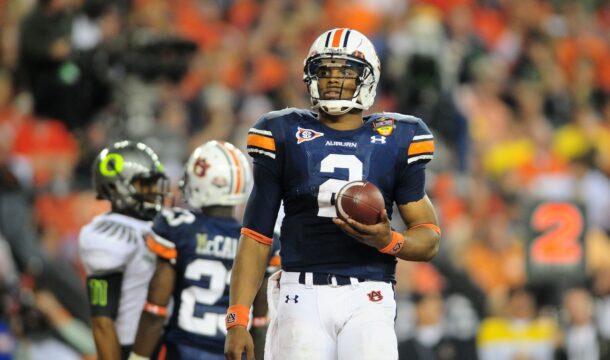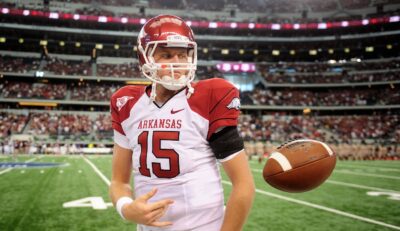Who are the best running backs in LSU history? We narrow it down to the top five.
5. Jimmy Taylor (1956-57) — Taylor was a workhorse in his two years playing for the Tigers, finishing fifth and second in the SEC in carries in 1956 and ’57, respectively. He formed a one-two punch with Billy Cannon running the ball in his final season, which also happened to be Taylor’s best year. He put up 762 yards and 12 scores that season, winning SEC Player of the Year while earning All-America honors. Taylor played an NFL career that featured five Pro Bowl appearances, a Super Bowl championship with the Packers and an induction into the Pro Football Hall of Fame.
Career stats: 1,314 yards rushing, 20 TD
4. Dalton Hilliard (1982-85) — Hilliard had one of the most consistently excellent careers in SEC history, topping the 4,000-yard mark by the end of his four years. He scored double-digit touchdowns in three of his four years and went over 900 yards three times, including consecutive 1,000-yard seasons to end his career. Hilliard was a brilliant receiver as well, catching 30 or more passes in three of his four seasons. Hilliard has the most carries in school history and is second in rushing yards. Standing just 5-foot-8, Hilliard relied on quickness, elusiveness and a deceptive cutting ability to torch SEC defenses all four years at LSU. Hilliard played eight years in the NFL with the New Orleans Saints, making the 1989 Pro Bowl. His nephew, Kenny, just finished a four-year career at LSU.
Career stats: 4,050 yards rushing, 44 TD; 1,133 yards receiving, 6 TD
3. Charles Alexander (1975-78) — Alexander, elected to the College Football Hall of Fame in 2012, was a two-time All-American for LSU, one of just nine players in school history to achieve the feat. He won the SEC Player of the Year award in 1977 after rushing for nearly 1,700 yards and scoring 17 touchdowns and led the SEC in rushing in both ’77 and ’78. Those seasons still stand as the top-two seasons for carries by an LSU back, while Alexander left school as LSU’s all-time leading rusher (he’s now third) as well as with the school’s single-game rushing record. He still holds LSU’s single-season rushing record.
Career stats: 4,035 yards rushing, 40 TD; 431 yards receiving, 4 TD
2. Kevin Faulk (1995-98) — LSU’s all-time leading rusher stands as one of the most versatile backs in SEC history, standing third in SEC history in touchdowns scored and fourth in yards from scrimmage. Faulk passed Alexander and Hilliard in several career marks, including yards per game for a career and touchdowns scored, while leaving school as the Tigers’ leader in yards per carry. He still holds records for most 100- and 200-yard games, has three of the top-10 rushing seasons in school history and the most 1,000-yard seasons in school history. Faulk twice led the SEC in yards from scrimmage and is also one of the best kick returners in school history. He played a 13-year NFL career with the New England Patriots, serving as a vital cog on three Super Bowl champions.
Career stats: 4,557 yards rushing, 46 TD; 600 yards receiving, 4 TD; 1,676 combined punt and kick return yards, 3 TD
1. Billy Cannon (1957-59) — By most accounts, Cannon is the greatest player in LSU history, regardless of position. The 1959 Heisman trophy winner was a do-it-all weapon for LSU, a unique player for his day with uncommon strength and speed. On top of his Heisman win (he also finished third in 1958), Cannon was a two-time All-American and SEC Player of the Year (1958-59), taking home the 1959 Walter Camp award as well. Cannon’s best season was actually 1958, when he won the UPI National Player of the Year award, topped the SEC in total yards and touchdowns and led LSU to its first national championship. Perhaps his most famous moment, though, is an 89-yard punt return against Ole Miss on Halloween night in 1959. A member of the College Football Hall of Fame, Cannon was the No. 1 pick in both the NFL and AFL drafts in 1960, electing to sign with the AFL’s Houston Oilers. He had an excellent career in the league, winning two league championship game MVPs as the Oilers won the title in his first two seasons. He moved to tight end after a back injury and won another AFL championship with the Oakland Raiders.
Career stats: 1,867 yards rushing, 19 TD; 522 yards receiving, 2 TD
A former freelance journalist from Philadelphia, Brett has made the trek down to SEC country to cover the greatest conference in college football.







